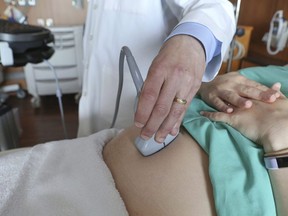“Analysis current that older women are generally greater able to have kids,” notes Professor Francesca Scala of Concordia Faculty’s Political Science Division.

Article content material materials
As more and more extra Canadians choose to have kids later in life, a modern analysis reveals pregnancies at 35 and older are normally stigmatized by medical strategies and public insurance coverage insurance policies.
Business 2
Article content material materials
“There’s various emphasis positioned on biomedical risks,” explains Francesca Scala, political science professor at Concordia Faculty and co-author of the analysis.
Some hazard parts can enhance with age. The Public Effectively being Firm of Canada cites “premature supply, low supply weight, miscarriage, placenta previa, gestational diabetes, pre-eclampsia, supply by caesarean half” as points that will develop to be further frequent.
Nevertheless whereas she acknowledges that these are “official concerns” and future mothers should be successfully educated sooner than making alternatives, Scala highlights that such emphasis can paint older mothers as “in peril” or “irregular” or “irresponsible reproductive residents.”
As an example, the PHAC writes in a 2008 doc that the tendency to push once more pregnancies until later in life is “an infinite medical and public properly being concern.”
Business 3
Article content material materials
In Quebec, since November 2021, costs of in vitro fertilization are solely lined for women under 42 resulting from a lower chance of being pregnant that shortly declines spherical this age.
And even when completely completely different organizations pay shut consideration to not impose any moral judgment on the price of the lifetime of a person with a incapacity, there could also be various emphasis positioned on the chance that an older mother presents supply to a child with a incapacity, Scala says.
“There’s this idea that girls are the one ones liable for children … that maternity consumes their entire life.” Women who’re older, who’ve gray hair normally are usually not thought-about “a terrific mother,” she says.
She cites a analysis on in vitro fertilization produced by the Canadian Medical Affiliation in 2015. Whereas the textual content material says that stopping women from having access to these corporations may very well be unethical, it gives that “older women have elevated hazard of issues that might put in danger the safety of the progenitor, along with psychological or social discomfort that the child may dwell through having a mother the right age to be a grandmother.”
Business 4
Article content material materials
Scala says she thinks ageism “has a job on this.”
She notes that “analysis current that older women are generally greater able to have kids. They’ve the financial property to care for his or her offspring they normally have relationship stability.
“Newest analysis moreover counsel that older maternity is said to long-term benefits for teenagers, like greater language talents and better instructional performances.”
Nevertheless with out unhealthy intentions, personal aspirations and maternity are generally supplied as being in opposition, she acknowledged. As an example, a info printed by the The Society of Obstetricians and Gynecologists of Canada in 2011 explains that as a result of inaccurate notion that assisted reproduction works every time, “sadly this will give women a false sense of optimism that they will delay their being pregnant whereas they pursue their education and occupation.”
The data has since been withdrawn by the society.
“On one hand, women are impressed to have a occupation, to be self-sufficient and have a gentle relationship, nonetheless then once more, we warn them that their natural clock is ticking,” Scala says.
The analysis, titled “Problemating older motherhood in Canada: ageism, ableism, and the harmful maternal matter,” was printed in March by the journal Effectively being, Menace & Society. It studied about 20 publications from properly being associations and governments from 1993 to 2021.


